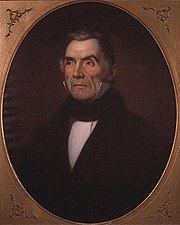|
Wolfred Nelson
Wolfred Nelson (10 July 1791 – 17 June 1863) was the mayor of Montreal, Quebec, from 1854 to 1856. BiographyNelson was born in Montreal. His father, William Nelson, was an immigrant to Colonial America from Newsham, North Yorkshire, England. His mother, Jane Dies, was a teacher and daughter of an important land owner in the New York area. Along with his younger brother Robert Nelson, he was known as a member of the Patriotes and for his leading role in the Lower Canada Rebellion. Nelson studied at the school of his father in William Henry. He became a physician in January 1811 and subsequently served in that capacity with the British troops on the War of 1812. He moved to Saint-Denis-sur-Richelieu where he opened a distillery. He entered politics when elected in William Henry in 1827. He supported the Parti Patriote. In 1827, he was elected as a member of the Legislative Assembly of Lower Canada, but he gave up active politics in 1830, without disavowing his reformist allegiance. He became a Patriote leader in the region of the Richelieu River valley, and supported the use of arms at the Assemblée des Six-Comtés in 1837. In a prelude to the Lower Canada Rebellion of 1837, Nelson led 5,000 Patriotes in the two-day Assembly of the Six Counties in Saint-Charles, Lower Canada (present-day Quebec), on 23 and 24 October 1837, to protest the government's Russell Resolutions, taking place despite the 15 June Proclamation forbidding public assemblies. At one point he interrupted Papineau's speech, saying, "As for me, I am of a different opinion from that of M. Papineau. I claim the time has come to melt our spoons to make bullets." The conference delegates approved the Thirteen Resolutions, based on the republican document Rights of Man written by British and later American Revolutionary Thomas Paine, which was also adopted by proponents of both the American Revolution and the French Revolution. A Column of Liberty was also erected in Saint-Charles' Square.[1][2]  On 16 November 1837, he and 25 others were charged with high treason. Louis-Joseph Papineau and Edmund Bailey O'Callaghan joined Nelson at Saint-Denis at some point before 23 November 1837, where Papineau and O'Bailey decided to resist arrest and escape to the United States (into Vermont) following the Battle of Saint-Denis.[3] On 28 February 1838, after having crossed the border from Vermont, Nelson, along with 300 to 400 Patriotes from a secret group called Frères Chasseurs, distributed copies of a declaration of independence written by Nelson's brother, Robert Nelson.[4] Inspired by the United States Declaration of Independence, the document listed their grievances with the British colonial government in Lower Canada, and defended their right to overthrow that government.[5]  Later, he led a group of armed citizens who resisted arrest by the authorities at St-Denis. He was arrested soon after. (See Lower Canada Rebellion.) Exiled to Bermuda in 1838, Nelson was granted amnesty by the British colonial government and came back to Montreal in 1842. In 1844, he was elected to the new Parliament of the Province of Canada. In 1854, he became mayor of Montreal, and he died in June 1863. He is interred in the Anglican cemetery in Sorel-Tracy and is commemorated by a park in Mercier-Hochelaga-Maisonneuve borough. Works
GalleryReferences
Sources
|
||||||||||||||||||||||||


